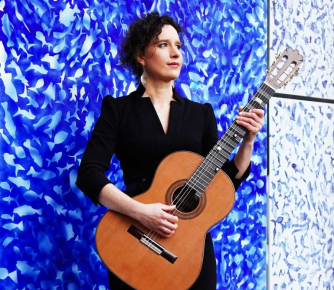Details
Clothworkers Centenary Concert Hall
The School of Music
University of Leeds
Leeds
LS2 9JT
England
Programme
György Kurtág – Flowers We Are
Maurice Ravel – Miroirs
Hildegard of Bingen – O gloriosissimi lux vivens angeli
Hildegard of Bingen – Sed diabolus
Frédéric Chopin – Berceuse, Op.57
Béla Bartók – Out of Doors (Szabadban), Sz.81: The Night's Music
Scott McLaughlin – New work for Ligeti Guitar and Electronics (World premiere)
Performers
Katalin Koltai – guitar
Programme Note
Transforming the Guitar
Dr Katalin Koltai is an innovative guitarist, practice-based researcher and inventor of the Guitar Magnet Capo System, Ligeti Guitar and Open Frets Guitar, expanding the horizons of guitar performance. She develops repertoire with novel features, utilising new technology in arrangements and collaborative work with composers. She is at the forefront of premiering music by leading contemporary composers, serving as an Honorary Research Fellow at the Royal Academy of Music. www.katalinkoltai.com
This programme showcases new music and arrangements performed on the Ligeti Guitar, offering a fertile world of new guitar soundscapes and extending the boundaries of the traditional guitar’s language. The Ligeti Guitar is an augmented instrument, developed by Dr Koltai during her PhD. It features a magnetic fretboard and system of single and double-string magnet capos which press the strings into the fret, enabling rapid transformation of the open strings without re-tuning. This revolutionary technology allows the play of any combination of fretted notes, radically extending the guitar’s voicing and harmonic capacities, and offering creative opportunities in various fields. The idea of this instrumental design originated from arranging György Ligeti’s piano piece, Musica ricercata for guitar. This connection with Ligeti’s music inspired the choice of the instrument’s name. In this concert programme, the guitar undergoes continuous transformation by altering the open strings to complement the compositional ideas presented in a variety of arrangements.
In Ligeti’s Musica ricercata, the guitar undergoes a transformation to accommodate pitch set classes. Ravel’s Miroirs, arranged for guitar, evokes haunting melodies of landscapes and a diverse range of timbres, reflecting Ravel’s original piano orchestration. In Bartók’s Night's Music, the guitar's sonic landscape revolves around a cluster, creating an atmospheric background for Hungarian folk melodies and scattered nocturnal sounds. The arrangements of monophonic music by Hildegard von Bingen reflect the expressive poetry of the compositions. In Chopin’s Berceuse, the strings replicate the ostinato bass, allowing for the freedom of virtuosic piano passages. The arrangements of Kurtág’s music are the result of Dr. Koltai’s collaboration with the composer himself, collaborating to adapt a selection of pieces for Ligeti Guitar during 2021 in Hungary. Finally, Scott McLaughlin’s New work for Ligeti Guitar and Electronics explores the central theme of transformation, capturing and manipulating string transformations to generate innovative soundscapes.

 Your events at Classical Events
Your events at Classical Events

